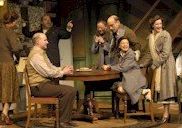The Arts Club Theatre Company
of Anne Frank
by Frances Goodrich and Albert Hackett; newly adapted by Wendy Kesselman
Dates 22 September - 26 October 2005 Venue The Stanley Industrial Alliance Stage Reviewer Jane Penistan
 |
|
The Diary of Anne Frank |
This new adaptation of The Diary of Anne Frank is a more compact and compassionate version of the famous diary than the one which has become so popular and familiar. Using this newer script, Rachel Ditor has given us a frighteningly realistic glimpse of the life of Jewish families in hiding in Holland in the Second World War.
Being confined in a small space is nerve racking, but in danger, and in the company of strangers, almost intolerable. The eight disparate refugees in the Franks' annexe are seen through the eyes of an adolescent as she confides her observations and thoughts over the ensuing two years, to her friendly diary.
Ted Roberts has presented a two tiered set with obscured windows. There is room for the actors to move freely, and it is only when all the cast are on stage together that the all confining walls are indeed both a defence and a claustrophobic prison. Marsha Sibthorpe's lighting admirably sets the time of day and night and the seasonal changes, giving occasional bursts of sunshine into the dim upper floors of the tall warehouse. The clothes, designed by Rebekka Sorensen, reflect the personalities of the various characters without ever overemphasizing any unnecessary trait.
Richard Newman as Otto Frank gives a beautifully controlled and eloquent performance. He has the quiet dignity and compassion of a leader who knows how best to keep his assorted companions in as much harmony as is humanly possible. His is the brain that prepared the refuge, stocked it with as much food for thought and food for sustenance as possible, and organized friends to bring in supplies for the prolonged siege which was to ensue. His closing monologue is neither sentimental nor oratorical but heartbreakingly moving.
Jennifer Clement as Edith Frank is the devoted mother of two very dissimilar daughters, one more adult than child, and one full of life and energy, imagination and restlessness. Added to this, she has the responsibility of making the small amount of food attractive and digestible, and equally distributed among her own family and that of the Van Daan's and the cantankerous Mr Dussel. Her weariness is evident, but she is gentle and uncomplaining. Margot Frank is Anne's sister. Anna Cummer is the wiser older sister, who can understand her mother's anxieties, but is also a comfort to her exuberant little sister.
The Van Daan family is not as academically inclined as the Franks. Mr Van Daan (Bill Dow) is Otto Frank's business partner, a man of some means, plenty of business acumen, but little sensitivity, while his wife, elegantly played by Gina Chiarelli is accustomed to the material good things of life. Existing in the poverty and restrictions of wartime Holland is beyond her comprehension. Their son Peter is in the throes of adolescence, shy in the presence of girls and withdrawn from adults. His consolation is his cat, and the privilege of a small space of his own. Ryan Beil manages the maturing of this young man with considerable skill.Without the courageous, intrepid, self-effacing Miep (Tasha Faye Evans) the inhabitants of the annexe would have starved. Miep brings news of the outside world with what food and other things she can scrounge for the refugees. She is a source of light, life and hope.
As Anne Frank, newly graduated from UBC, Anastasia Phillips is the centre of the action. From carefree child through the disturbing complexities of becoming an adult, suffering nightmares, and the sense of abandonment that beset all adolescents, she gives a convincing performance. Her contemplative monologues are delivered with grace and clarity. Even her tantrums are amusing, and much of her dialogue brings the needed humour to this bleak environment. With Peter, she begins to hope for a future of love and happiness after the war. Their youthful faith and hope make their inevitable fate even more poignant.
On the opening night, the stunned silence at the end of the play says more than the following burst of applause could do to express how moved and involved the audience had been by the excellence of the performance.
The Diary of Anne Frank runs at the Stanley Industrial Alliance Stage 22 September - 26 October 2005 at 8.00 p.m., Monday through Saturday with selected matinees and special performances. For information, tickets, and reservations call the Box Office at 604.687.1644 or Ticketmaster at 604.280.3311, or visit www.artsclub.com
© 2005 Jane Penistan